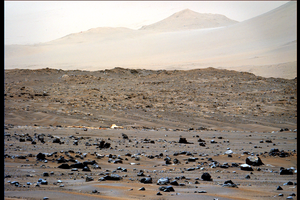Scientists believe that cellulose may be a biomarker of extraterrestrial life.

International group of scientists with researchers from the University of Gottingen conducted an experiment in which she tried to find out whether the tea fungus can survive in Mars. It turns out that it may not be complete, according to Science Daily.
Tea mushroom (kambucha) is a drink produced by fermentation of candied tea with tea fungus, symbiotic culture of bacteria and yeast. Scientists have recreated the Martian environment in the laboratory. This environment has destroyed the microbial ecology of the fungus, but cellulose-producing bacteria have survived.
Read also: Mars rover Curiosity discovered strange “pillars” on the Red Planet
These results showed that cellulose produced by bacteria is probably responsible for their survival in extraterrestrial conditions. In addition, it suggests that cellulose may be a biomarker of extraterrestrial life, and cellulose-based membranes or film may be a biomaterial to protect life and produce consumer goods in settlements on other planets.
Another interesting aspect of this experiment may be the development of a new drug delivery system, for example, for use in space. In addition , scientists have found that the number of antibiotic and metal resistance genes in these cultures has increased. This means that they can survive despite the effects of antibiotics or metals on them.
This is not the first study on the behavior of tea fungus in space. In 2014, an experiment was conducted as part of the Biology and Mars Experiment project with the support of the European Space Agency, then the tea mushroom was sent to the ISS. The aim was to learn more about the reliability of cellulose as a biomarker, the genomic architecture of the tea fungus and its behavior in extraterrestrial conditions. After 1.5 years in simulated Martian conditions outside the ISS, the samples were reactivated by the Earth and they have been cultivated since 2.5 years.
Earlier American scientists said that conditions under the surface of Mars may be suitable for existence of microbial life . To reach such conclusions, researchers studied the composition of Martian meteorites that fell to Earth.




